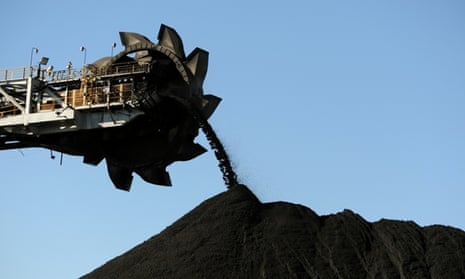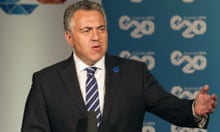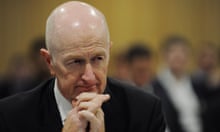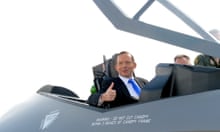The renewable energy industry has labelled a controversial Abbott government review an “unprecedented scam” and a “stitch-up” after learning that it was conducting electricity industry modelling on the assumption there would be no risk or cost to investments in coal-fired power stations in the next few decades.
The review of the renewable energy target – headed by veteran businessman and self-professed climate sceptic Dick Warburton – and its modellers from ACIL Allen consulting held a workshop with industry participants on Wednesday at which they revealed the modelling would assume investors in fossil fuel generation would not need to factor in any risk due to climate policies for decades – neither a carbon price, nor a requirement to invest in emission-reducing technologies, nor any cost from any other government policy or regulation.
Many of the 50 participants said this assumption was entirely unrealistic.
John Grimes, chief executive of the Australian Solar Council, said it made the whole review a farce.
“This is an absolute stitch-up. They are predetermining the outcome of this modelling by the assumptions they are making … it is an unprecedented scam in policy-making and it needs to be called for what it is,” Grimes told Guardian Australia.
“It is clear that the RET review report will protect the vested interests in the current electricity market.”
Grimes said that any model that ignored international action on climate change and failed to consider a carbon price up to 2030 “lacks any credibility”.
Ric Brazzale, managing director of Green Energy Trading, said it was “ridiculous to assume you can increase greenhouse emissions for decades with no kind of cost or risk at all”.
“They are not going to come up with a fair outcome if they assume there is no carbon price and no kind of carbon constraint at all,” Brazzale said.
It is understood the workshop was also told the review had not considered the government’s election promise to provide subsidies to put solar panels on another one million roofs because there was as yet no policy detail behind it.
Dick Warburton, a veteran industrialist and current chairman of the Westfield Retail Trust, described his views on climate science in a 2011 interview on ABC.
“Well I am a sceptic. I’ve never moved away from that. I’ve always believed sceptical,’’ he said. “But a sceptic is a different person than a denier. I say the science is not settled. I’m not saying it’s wrong. I’ve never said it’s wrong, but I don’t believe it’s settled.”
He is joined on the review panel by the former executive director of the Australian Bureau of Agricultural and Resource Economics, Brian Fisher, director of Asciano Limited and the CSIRO, Shirley In't Veld and the managing director of the Australian Energy Market Operator, Matt Zema.
The review is charged with looking at “the economic, environmental and social impacts of the RET scheme, in particular the impacts on electricity prices, energy markets, the renewable energy sector, the manufacturing sector and Australian households” and with assessing how it fits with the government’s aim of “reducing business costs”. It has asked for submissions on whether the RET should be “abolished, reduced or increased”.
The target – introduced by the Howard government and expanded by the Rudd government – now requires that 41,000 gigawatt hours of energy be sourced from renewables by 2020.
At the time it was enacted that represented 20% of the market, but due to falling electricity demand, it will now be well over 20% – which has prompted calls for the target date to be pushed out or the target reduced, including a plan privately floated by the environment minister, Greg Hunt, for it to become a 25% by 2025 target.
But others, including the government’s top business adviser, Maurice Newman, want the RET scrapped altogether.
Newman, the former chairman of the ABC and the ASX, has said persisting with government subsidies for renewable energy represented a “crime against the people” because higher energy costs hit poorer households the hardest and there was no longer any logical reason to have them.
In setting up its own RET review, the government bypassed the Climate Change Authority – which it wants to abolish – but which is required by legislation to undertake regular reviews of the RET.





Comments (…)
Sign in or create your Guardian account to join the discussion